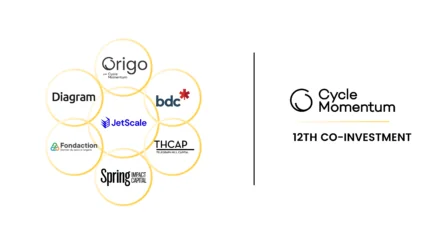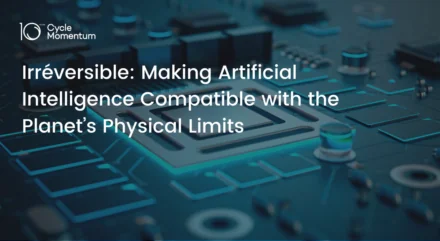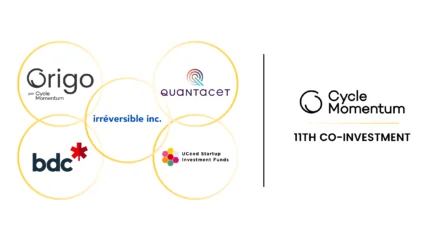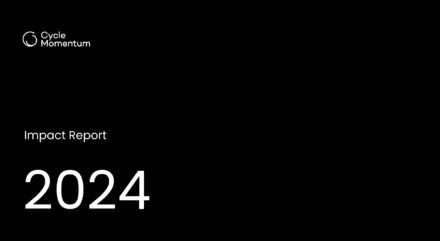By Morgan Guitton, VP Programs at Cycle Momentum – Thibault Beudin, Communication Officer at Cycle Momentum & Rayan Mebtoul, Marketing, Events, and Communications Intern at Cycle Momentum.
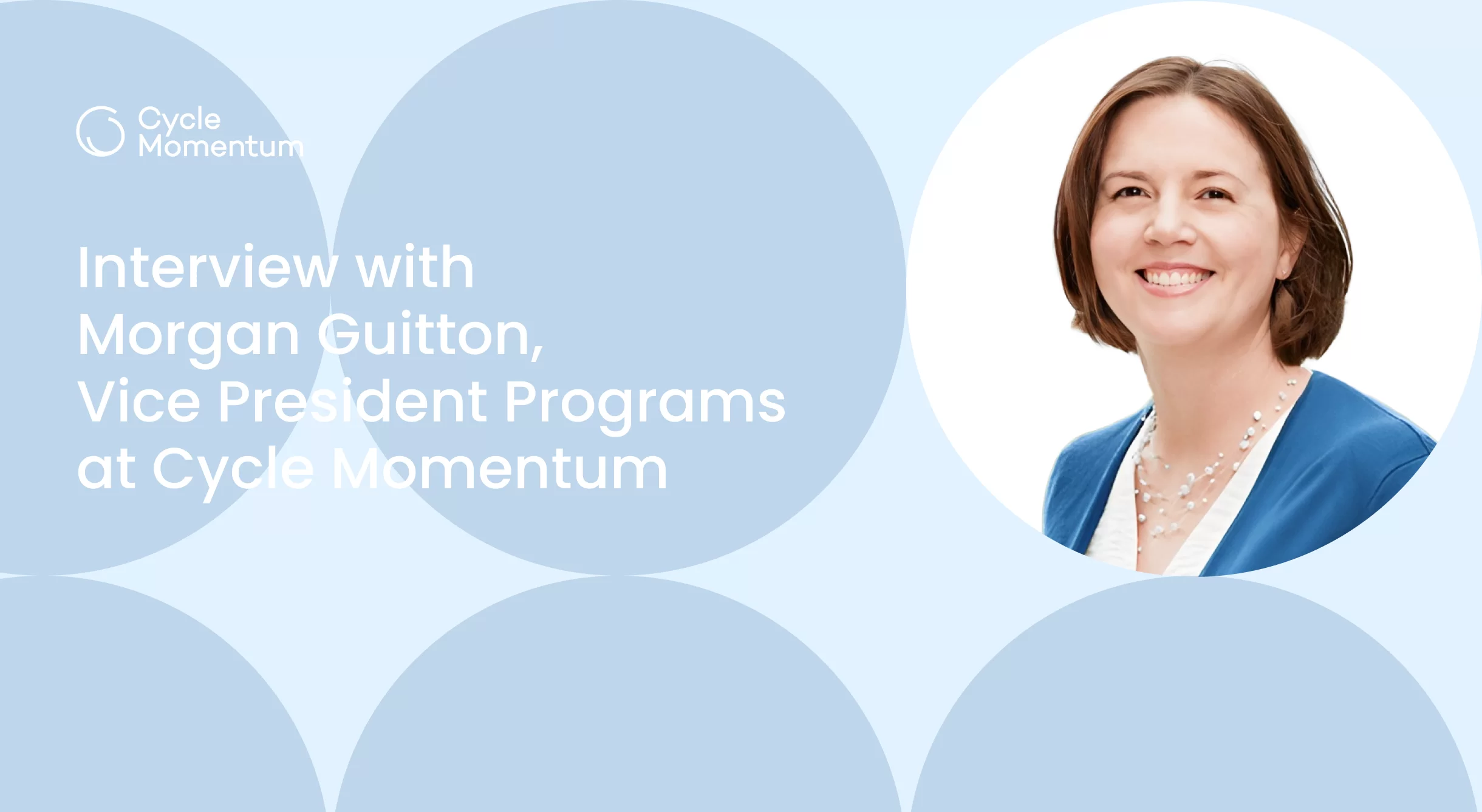
In this interview, we give the floor to Morgan Guitton, Vice President of Programs at Cycle Momentum. Over the past five years, she has been involved in the evolution of various startup support programs offered by Cycle Momentum. She shares the highlights of these acceleration programs and Cycle Momentum’s commitment to entrepreneurs.
You Are Vice President of Climate Technology Programs – Can You Tell Us More About Your Role?
Of course! It’s quite straightforward – I lead the team that manages our programs. When I first joined Cycle Momentum, we were running two clean tech acceleration cohorts per year, and I was responsible for ensuring everything ran smoothly. Cycle Capital, a leading venture capital player in clean technologies, founded the accelerator. At the time, they identified a gap in the Canadian ecosystem in terms of early-stage support and funding. The objective was clear: increase the number of cleantech startups in Canada, improve project quality and success rates, and become a prime source of high-potential companies for venture capital investors.
That mission still drives us today. Over the past five years, in collaboration with external partners such as Zone Agtech, Hydro-Québec, the Circular Innovation Fund, Cascades, and Esplanade Québec, we have significantly expanded our offering. Startups now gain access to essential resources, market intelligence, and support networks through Cycle Momentum. We’ve added thematic programs (Agtech, circular economy, sustainable packaging, decarbonization, built environment, etc.), collaboration opportunities with larger companies and innovative businesses, financing opportunities through the Origo program and the Partner Fund Circle, and more recently, the Lab-to-Startup program that accelerates the transition of clean technologies from lab to market, with a focus on ongoing research and the development of climate technologies. Our accelerator actively supports clean energy innovations and startups, helping drive the adoption of sustainable, low-carbon solutions. Renewable energy is a core focus within our clean tech and climate tech sectors, with particular emphasis on solar and wind power as key drivers for decarbonizing the energy sector.
So from a single person managing a program, we’ve grown into a team of five employees and about thirty experts, mentors, and entrepreneurs, offering a much wider range of services covering the entire maturity spectrum of climate tech startups, supporting startups and fostering innovations in climate technologies.
Let’s Focus on The Acceleration Programs. How Do They Work Exactly?
Our programs last four months and are structured in small cohorts of entrepreneurs selected through a rigorous selection process. As one of the leading startup accelerators in the climate tech space, Cycle Momentum provides participants with access to essential resources and industry connections. They receive personalized support through targeted workshops, mentoring, coaching, and benefit from a collaborative environment with other entrepreneurs, in-residence experts, and partners. Mentors and experts take a hands-on approach, offering practical guidance to help startups navigate challenges and develop effective strategies. They often culminate in a pitch to investors, preparing startups for successful market entry.
The goal is to help startups reach a major milestone quickly – to structure themselves and become “fundable.” It’s also a space for peer-to-peer support, which is incredibly powerful.
Why Are Clean Technologies or Climate Tech Harder to Bring to Market?
They are more complex to bring to market because, in most cases, they require long development times and significant infrastructure capital (CAPEX), and thus business models adapted to these realities. The urgency of addressing climate change makes the rapid development and deployment of climate technologies even more critical. Climate tech refers to a broad range of innovative solutions aimed at decarbonization, adaptation, and reducing environmental impact across sectors. That’s exactly why we exist: to help entrepreneurs turn innovation into economic and environmental value. We prepare them to raise funds, connect with their first customers, and bring their vision to life in a realistic, structured framework, emphasizing the importance of developing and deploying climate technologies.
I would say our strength lies in helping them rethink business development based on a go-to-market roadmap supported by customer feedback, rather than focusing only on technological development or aiming – often unrealistically – to raise millions for their first plant. When raising funds, we highlight the growing investments in the sector and the crucial role of startup funding in supporting new climate solutions. Our funding plan ensures that funding rounds are structured to support key milestones and long-term growth.
How Do You Support Long-Term Growth of Climate Tech Startups?
Our first question to an entrepreneur is often: “Do you know what keeps your customer up at night?” Because that’s the problem to solve.
Many climate tech entrepreneurs are brilliant scientists who have developed a fantastic solution to a major issue. Their challenge is often to look beyond the strength of their technology and craft a strong value proposition based on measurable client benefits. These benefits must be environmental, of course, but also economically sound.
That’s where our experts step in to help them articulate these benefits in a structured way, build a business case for a client, foster innovations that address client needs, and demonstrate – quantitatively – how their product solves the problem.
We also help them put themselves in their customer’s shoes, listen carefully to concerns around the technology, and figure out how to progressively address these issues and de-risk adoption. From there, we support them in building a realistic go-to-market plan based on technical or operational milestones that matter to the client. Additionally, our program helps startups prepare for market entry by validating their value propositions, building industry connections, and ensuring they are ready for investment and commercialization.
This is really our primary area of intervention. I can think of many cases where an expert sat down with an entrepreneur to make live calls to clients, coaching them on how to pitch the company – but more importantly – how to get the other person talking to truly understand their pain points and extract the information needed to craft the right offer.
Once that commercial strategy is clear, if a startup aims to raise venture capital, they must demonstrate solid unit economics – that is, show that the business is profitable by analyzing revenue and costs per product or customer. This is tough for any tech entrepreneur, and even more so in capital-intensive industries. In fact, most companies in the climate tech sector are planning to raise funds as they scale, even as they work to reduce their burn rates.
And, as my colleagues at Origo have pointed out, to reassure investors, you need a funding plan aligned with the commercialization strategy. Investors want to see how each funding round helps the company reach key commercial milestones and de-risk the project.
You Mentioned Thematic Acceleration Programs – Can You Elaborate?
Historically, cleantech was a sector in and of itself, so Cycle Momentum offered specialized programs from the start. Since then, sub-sectors have emerged with very specific needs. That’s why we’ve launched several thematic programs where entrepreneurs can exchange ideas around shared challenges: scaling issues in the decarbonization program, aligning milestones with seasonality in Agtech, and so on. Within our energy sector programs, renewable energy generation is a major focus area, with particular support for solar and wind power as key drivers of clean energy innovation. For example, electric vehicles play a crucial role in reducing global emissions as part of the broader effort to decarbonize transportation. The European Union’s policy framework and financial commitments further support renewable energy generation and green technology development, helping classify sustainable activities across these sub-sectors.
This also allows us to bring in partners and industry leaders to participate in the programs, emphasizing the importance of tracking GHG emissions and adopting innovative material solutions. The significance of VC investment is also evident, as venture capital funding supports these initiatives and accelerates the growth of climate tech startups.
How Do You Support Startups Beyond Acceleration?
Effective portfolio management is at the heart of building successful climate tech companies. Once startups complete our accelerator program, the journey is far from over. Climate tech startups face unique challenges as they scale – navigating complex markets, refining their product-market fit, and securing the right investment to fuel their growth. This is where hands-on support from experienced portfolio managers becomes invaluable.
Our approach goes beyond traditional mentorship. We connect portfolio companies with a global network of industry experts, venture capitalists, and fellow entrepreneurs, opening doors to new funding opportunities and strategic partnerships. This network is crucial for early stage startups, providing them with the insights and resources needed to overcome industry challenges and accelerate their transition from promising ideas to impactful climate tech solutions.
By supporting startups well beyond the initial acceleration phase, we empower them to focus on developing innovative solutions that address the climate crisis and drive a more sustainable future. Our goal is to create a robust pipeline of scalable, investment-ready companies that can attract further funding and play a crucial role in the global energy transition. Through ongoing portfolio management, we help climate tech startups turn their vision into reality, ensuring their growth contributes to a more sustainable future for all.
How Do You Approach Emissions Reduction in Hard-to-Abate Sectors?
Industrial processes are among the largest sources of greenhouse gas emissions worldwide, making them a critical focus for climate tech solutions. Sectors like cement, steel, and chemicals are particularly challenging to decarbonize due to their reliance on high-temperature processes and fossil fuels. Reducing emissions from these hard-to-abate sectors is essential for achieving a net-zero economy and minimizing environmental impact.
Innovative solutions such as carbon capture and storage, green hydrogen, and advanced materials are transforming how industries approach energy consumption and emissions reduction. Carbon removal technologies, including Direct Air Capture and soil carbon sequestration, are also essential for directly eliminating CO2 from the atmosphere and play a crucial role in achieving net-zero emissions. Climate tech startups are at the forefront of this movement, developing technologies that not only lower emissions but also improve efficiency and sustainability in industrial processes. The European Union’s latest climate tech report underscores the urgent need for action in these sectors, and we’re seeing a wave of startups rising to meet this challenge with groundbreaking technologies.
By supporting these startups and scale-ups, we can accelerate the transition to a more sustainable future, helping industries reduce their carbon footprint and adopt cleaner, more efficient processes. Our commitment is to foster the next generation of climate tech companies that will lead the way in emissions reduction, energy transition, and the creation of a circular economy.
Is That All?
Of course not – it’s also about human support. Every entrepreneur is a passionate individual with a big vision, often carrying their project on their shoulders, sometimes against all odds. That’s especially true in our field, where the urgency to act is clear, but the barriers are often greater than in other sectors.
So it’s critical for us to support the entrepreneurs as people too – because yes, we accelerate startups, but above all, we support entrepreneurs through the journey. That’s why, alongside workshops and working sessions, each entrepreneur is paired with an experienced founder. They can talk business, sure, but also discuss team dynamics, co-founder relationships, work-life balance, or stress from specific challenges. Human to human, who’s been through it before.
In many cases, the mentor-mentee relationship extends well beyond the program – we’re incredibly proud to have sparked these lasting connections. We often say our programs are built for entrepreneurs, by entrepreneurs.
Any Room For Improvement?
Plenty! But one major improvement I’d like to make is to systematically involve multiple industrial partners in the programs more formally. They would share their challenges, interact with entrepreneurs about proposed solutions, and provide feedback and guidance.
A Final Word?
Yes – there’s a saying that it takes a village to raise a child. Well, it also takes a village to launch a startup. That’s why I’m so happy with the role Cycle Momentum plays for entrepreneurs – alongside clean tech mentors, experts, partners, and program managers doing an amazing job coordinating it all and making sure everything runs smoothly.
The success of our entrepreneurs is our success! I’m always thrilled when I get a message from a founder who’s landed a client, when I see a new funding announcement, or when a mentor tells me they’re joining the startup we matched them with.
